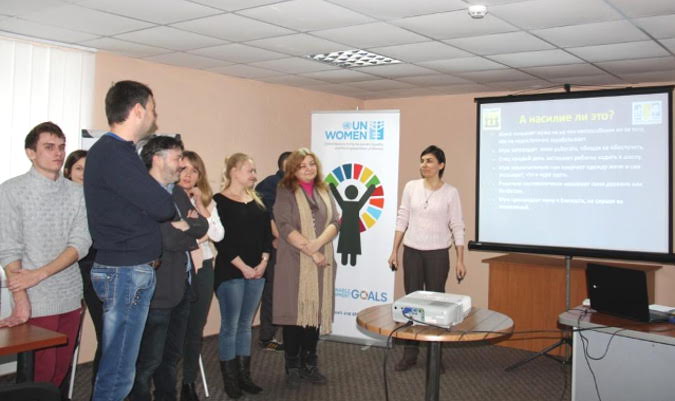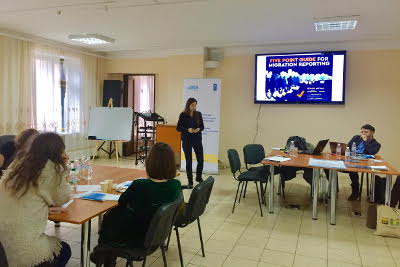Journalists learn how gender-sensitive reporting can foster conflict resolution
As part of Ukraine’s 16 days of Activism against Gender-based Violence campaign, 30 journalists from the Donetsk and Luhansk oblasts of eastern Ukraine received training on gender-sensitive, non-discriminatory reporting in conflict situations.Date:

Ms. Iryna Iryna Semenko moderates interactive session on how to define violence, Severodonetsk. Photo: Paralel Media/Volodymyr Lermontov
Ukrainian journalists at a UN Women-supported training session learned how responsible, gender-sensitive reporting on conflict and vulnerable groups can significantly contribute to reconciliation and social cohesion in crisis-affected communities.
Ukraine continues to experience lack of stability and security in the east. The conflict has had a particularly negative impact on internally displaced and conflict affected women and has worsened gender inequality throughout the country.
As a part of the 16 days of Activism against Gender-based Violence in Ukraine, 30 journalists from Donetsk and Luhansk oblasts received training on gender-sensitive reporting in conflict situations.
Organized by UN Women within the Joint UN Women-UNDP project, Restoration of Governance and Reconciliation in Crisis-Affected Communities of Ukraine, funded by the European Union, the training sessions were held in Sieverodonetsk on 25 November and 28 November in Kramatorsk.
The journalists, representing regional and national media outlets, discussed ethical and gender aspects of media work in conflict-affected communities with local activists and gender experts.
“We want to establish a dialogue between media, activists and gender experts so that the media ask themselves if their writing contributes to reconciliation and promotes non-discrimination,” said Ms. Eugenia Kuznetsova, UN Women in Ukraine National Communications Consultant.

Ms. Iryna Kupchynska is explaining international media standards on sensitive reporting. Kramatorsk. Photo:Paralel Media/Dmytro Potekhin
Negative media coverage on vulnerable groups, particularly internally displaced women, remains a problem in Ukraine. Participants learned how to use non-discriminatory and gender sensitive language and to apply a “do no harm” approach in their reporting.
“So many questions emerge these days, particularly in conflict reporting. We frontline journalists face these questions on a daily basis and often are not sure how to handle them,” said Ms. Vira Shelest, a journalist and activist from Kramatorsk.
Gender-based violence remains persistent in Ukraine. Women account for about 90 per cent of gender-based violence cases, according to a UNFPA report, and 22 per cent of women aged 15-49 have experienced at least one form of physical or sexual violence. There is little discussion of gender-based violence in the Ukraine, making sensitive media reporting crucial to raising public awareness about it.
Ms. Iryna Semenko, a gender expert from the Ukrainian Foundation for Public Health, said that often journalists do not realise the consequences of what they write, particularly when it’s about survivors of gender-based violence. Ms. Semenko and participants looked at TV broadcasts about survivors of gender-based violence, analysed the ethical issues and came up with practical recommendations on how to cover future gender-based and domestic violence cases.
“We urgently need to talk about gender-based violence through the media – in a sensitive manner, taking into account basic ethical issues about gender issues coverage,” Ms Semenko said.